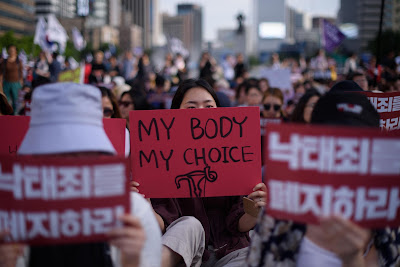Abortion is certainly on the rise in India, which is owing to the country's specific social and cultural issues.
Traditional viewpoints hold this practice in high regard,
yet there are occasions when it may be justified, such as when the mother's
life is at jeopardy, as with all things when seen through the lens of dharma.
With the principles of compassion, karma, and ahim, the fundamental hegemonic tenet driving the condemnation is that every life is sacrosanct. sa (ahimsa: nonviolence) came in second place.
Life is seen to begin at conception, and any attempt to hinder
the development of the fetus, a potential child, is considered murder.
Ancient writings, written in a society that valued big
families, are passionately opposed to abortion, depicting retribution and
eternal consequences for mothers who terminate their unborn children.
The jiva (soul) has lessons to learn and teach others karmically.
It is consequently improper to obstruct a child's karmic
advancement, even if the youngster is handicapped.
Humans have no right to steal someone else's life for their
own convenience after it has been entrusted to them during conception.
The important Socio-Scientific fact remains,
Determining the critical moment when:
1. The child is considered to cease to exist as co-dependent inside the Mother and
2. It exists as an individual with its own Human rights, and without impacting the health, well being and well fare of the Mother, given her own existential and socio-economic circumstances.
If a couple engages in sexual activity with the main goal of
reproduction and fertilization, it is their moral obligation to accept
responsibility for their acts and the life they have now produced.
Thus, it may be claimed that only sexual interaction between
husband and wife is dharmic in this aspect.
In India, population control entails abstinence (unless
children are planned), abortion, or contraception.
The first is the answer advocated by some, however it is
very utopian.
Many people would find abortion for unintended pregnancies
unacceptable.
Abortion is often practiced illegally as female feticide once the gender of the unborn child has been identified via ultra sound scans.
Thus, contraception, despite some opposition, would be the
practical solution, at least in the form of a barrier or the rhythm method
rather than emergency contraception as a type of abortion.
With the advancement of medical science, many Indians may now determine the gender of their unborn child and choose whether to retain it if it is a boy or terminate it if it is a girl.
Those in poverty who are unable to do so murder the infant girl as soon as she is born.
While all of this may seem unacceptable to Westerners, the
parents frequently face 'dharma dilemmas,' in which they argue that allowing
their daughter to die is preferable to allowing her to live a life of misery in
a society where dowry demands exist and where boys, not girls, are often seen
as the breadwinners.
As a result, some families see daughters as a financial
burden who cause issues for everyone, including themselves.
You may also want to read more about Hinduism here.
Be sure to check out my writings on religion here.
See also:
Ahimsa; Celibacy; Contraception; Dharma; Dowry; Feticide; Infanticide; Jıva; Karma; Samskaras.
References And Further Reading:
Coward, Harold G., Julius J. Lipner and Katherine K. Young. 1991. Hindu Ethics. Delhi: Sri Satguru Publications.
Crawford, S. Cromwell. 2003. Hindu Bioethics for the Twenty-First Century. Albany, NY: State University of New York Press.
Jackson, Robert and Dermot Killingly. 1991. Moral Issues in the Hindu Tradition. Stoke on Trent: Trentham Books Limited.
Menski, Werner. 2001. ‘Hinduism’. In Peggy Morgan and Clive Lawton, eds, Ethical Issues in Six Religious Traditions. Edinburgh: Edinburgh University Press, 1–54.





